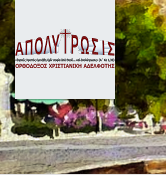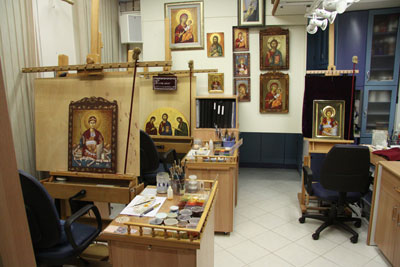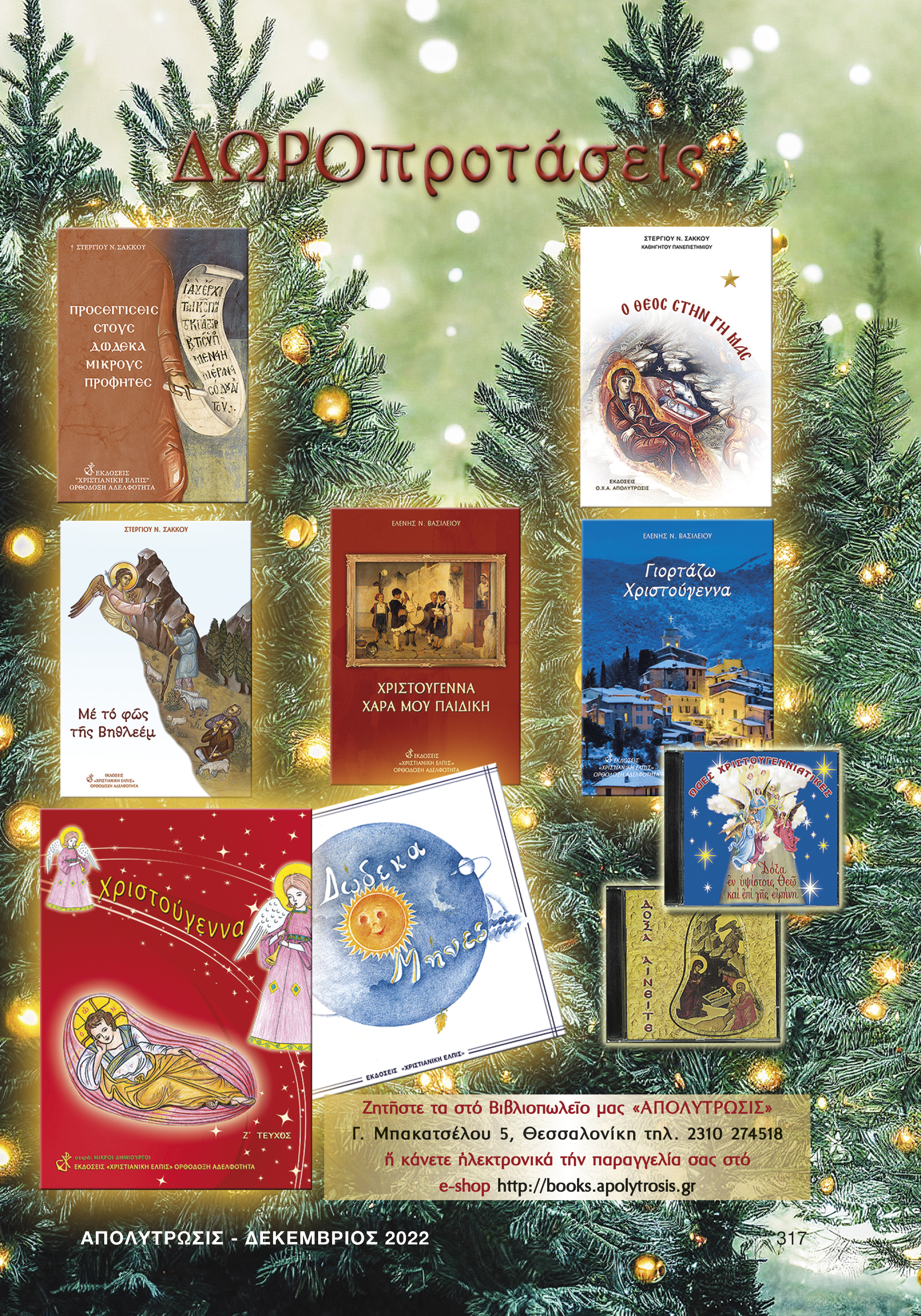 ΑΠΟΛΥΤΡΩΣΙΣ
ΧΡΙΣΤΙΑΝΙΚΗ ΟΡΘΟΔΟΞΗ ΑΔΕΛΦΟΤΗΣ
ΑΠΟΛΥΤΡΩΣΙΣ
ΧΡΙΣΤΙΑΝΙΚΗ ΟΡΘΟΔΟΞΗ ΑΔΕΛΦΟΤΗΣ

Articles (27)
REJOICE, THROUGH WHOM JOY SHALL SHINE FORTH!
Γράφτηκε από Super UserTranslation from the book:
Στεργίου Ν. Σάκκου, «Ὦ πανύμνητε Μῆτερ!», ἐκδ. «ΧΡΙΣΤΙΑΝΙΚΗ ΕΛΠΙΣ» ΟΡΘΟΔΟΞΗ ΑΔΕΛΦΟΤΗΤΑ, Θεσ/νίκη 2010, σσ. 35-45 (Stergios N. Sakkos [Read CV], "You, all-laudable Mother", pp. 35-45)
Joy is a great and vital theme in our life. Man was created to live in the joy of paradise and he actually experienced it in his communion with God. But disobedience to God’s will, sin, took him out of paradise. So, ever since he lived with the great poverty caused by the lack of joy. But he did not stop looking for it wherever he suspected that he could find even a trace of it, a drop of joy. Man could be described as a "beggar of joy and a hunter of truth" or "a beggar and hunter of true joy".
Of course, the Lord, in his Sermon on the Mount, blesses those who mourn (Mt 5:4) and the Lord’s brother James exhorts: “Change your laughter to mourning and your joy to gloom.” (Jas 4:9). Also, our Church always and especially during the period of Lent, strongly emphasizes mourning, repentance, deep distress for our sins. Perhaps this caused a misunderstanding: that Christians have nothing to do with joy but only with mourning. Some even equate Christianity with gloom. They claim that the Gospel opposes to joy, that it supposedly does not allow Christians to laugh and rejoice.
All this is said by those who do not know our Christian faith and they ignore the Bible. If they had read the book of Psalms even once, they would have found out how often it refers to joy, and in fact to complete, perfect joy. Perfect joy is both an internal and external state. It springs from the depths of the heart and is expressed in a variety of ways: “A happy heart makes the face cheerful” we read in the God-inspired Proverbs (Prov 15:13). Few of the many references from the book of Psalms will be cited here: “Therefore my heart is glad, and my tongue rejoices” (Ps 15:9 [16:9]). “I will be glad and rejoice in thy mercy” (Ps 30:8 [31:7]). “O let the nations be glad and sing for joy” (Ps 66:5 [67:4]).
We must remember that there are two "joys": the true and the false; the joy of the Church and the joy of the world; the joy of Christ and the joy of Satan; the joy of purity and holiness and the joy of debauchery and prodigality. Our Lord has made things clear. He gave us the attributes of true joy, of His own joy.
And what is Christ’s joy? How does it stand out from the joy of the world? Christ’s joy has two basic features: permanence, " no one will take away your joy" (Jn 16:22), and fullness, " I say these things while I am still in the world, so that they may have the full measure of my joy within them" (Jn 17:13; cf. 15:11). That is why the apostle Paul urges the faithful: " Rejoice in the Lord always. I will say it again: Rejoice!" (Phil 4:4; cf. 1 Thess 5:16).
Jesus Christ in the famous farewell speech to his disciples, after the Last Supper, reveals that God is triune. It is very interesting that in that same speech (see Jn 13-16) the Lord presents another holy trinity, which has to do with our spirituality, with our sanctification. He speaks of love, peace and joy, which in fact He distinguishes from those of the world; He refers to His own love, to His own peace, to His own joy; “Very truly I tell you, you will weep and mourn while the world rejoices. You will grieve, but your grief will turn to joy.” (Jn 16:20).
These three great and important gifts that Christ gives to his disciples, namely love, joy and peace, which are connected with the Last Supper, are recorded by the apostle Paul as the first three fruits of the Holy Spirit. “But the fruit of the Spirit is love, joy, peace” (Gal 5:22). What an amazing combination! How much it reveals and teaches us! Consequently, in order to have Christ’s love, to enjoy true peace, permanent and complete joy, we need the Holy Spirit. Only by the Holy Spirit do we obtain these great things, because these are His fruits.
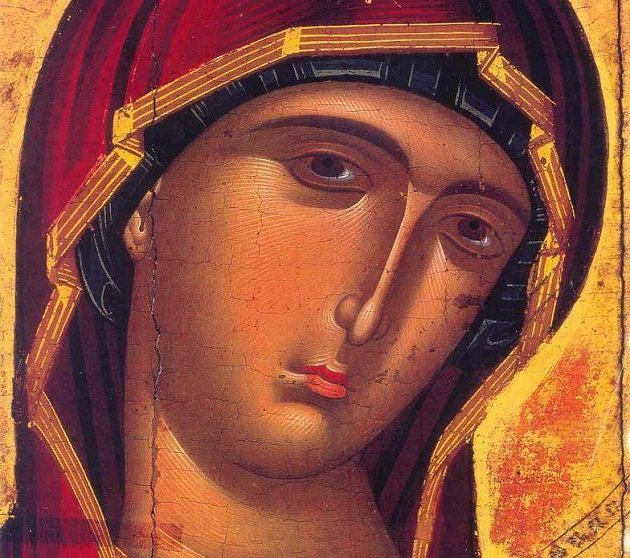 That is why virgin Mary radiates with joy! She is the one who received in her life the visitation of the Holy Spirit in a unique way, as the angel foretold her: “The Holy Spirit will come upon you, and the power of the Highest will overshadow you” (Luke 1:35). With the Holy Spirit, the humble girl of Nazareth conceived the fruit of life, our Lord Jesus Christ, the Redeemer, the donor of true and so the complete and inalienable joy. Thus, how can she not shine like the sun? She radiates her Son’s radiance. This is how the evangelist John saw her, as he writes in Revelation: "a woman clothed with the sun" (Rev 12:1). This is how she has been experienced by the Church in the first Stasis (A) of the Akathist Hymn, in the first Salutation that greets her with this verse: “Rejoice, through whom joy shall shine forth; Rejoice, through whom the curse shall vanish.”
That is why virgin Mary radiates with joy! She is the one who received in her life the visitation of the Holy Spirit in a unique way, as the angel foretold her: “The Holy Spirit will come upon you, and the power of the Highest will overshadow you” (Luke 1:35). With the Holy Spirit, the humble girl of Nazareth conceived the fruit of life, our Lord Jesus Christ, the Redeemer, the donor of true and so the complete and inalienable joy. Thus, how can she not shine like the sun? She radiates her Son’s radiance. This is how the evangelist John saw her, as he writes in Revelation: "a woman clothed with the sun" (Rev 12:1). This is how she has been experienced by the Church in the first Stasis (A) of the Akathist Hymn, in the first Salutation that greets her with this verse: “Rejoice, through whom joy shall shine forth; Rejoice, through whom the curse shall vanish.”
Do you want, then, to see joy not depicted in a painting, nor imprinted in a poem, but embodied in a person? Worship virgin Mary with reverence. She is the inexhaustible source of joy and the model of true joy. In the Small Supplicatory Canon (Small Paraklesis) we chant: " With gladness fill my heart, Most Holy virgin Lady, for you are she who received the abundant joy". Those who want to study joy, those who want to acquire joy, those who want to keep joy, those who want to rejoice, those who want to sing and praise the incarnated joy, let kneel before the blessed and highly favored Maria. In her virgin person they will meet joy at the highest and perfect degree.
"Your birth, O virgin Mother of God, proclaims joy to the whole world, for from you arose the Sun of Righteousness, Christ our God;” we sing on the feast of the Nativity of the blessed virgin Mary. She is the one who gave birth to the source of true joy, the sun of righteousness. Her completely special and unique relationship with Jesus Christ made her a spiritual sun, which radiates joy to all, young and old; to the happy she increases their joy and to the sad ones she dissolves their sorrow. She did not cease to radiate joy even during her hard hours of pain, when she saw her Son naked, humiliated, wounded, hung on the cross; when a sword pierced through her soul, just as Simeon had prophesied (see Luke 2:35). In those moments when the pain pierced her soul, no other mother has ever experienced a pain greater than this one, the virgin Mary patiently endured. The Holy Spirit from within comforted and guided her, so that she could interpret the Lord’s Passion, to see in it the redemption of the human race. This is wonderfully expressed by many Theotokia and in fact Stavrotheotokia, which are chanted in the Services of Wednesday and Friday.
The value of a good and ripe fruit becomes obvious when we place it near a rotten or an unripe one. Genuine currency is better valued when compared to counterfeit currency. Similarly, the joy of our Most Holy Lady, the most favoured and obedient God’s servant, who co-operated in the mystery of our salvation, shines more dazzlingly when we compare it with the situation in which our race was led by Eve’s disobedience. This is what the second verse points out: “Rejoice, through whom the curse shall vanish.”
Our Most Holy Lady incarnates, expresses and gives to all of us the greatest, the strongest joy, because she played a unique role in the world history. She became God's partner in the fulfillment of the First Gospel=First Good News (see Ge 3:15)
• to crush the devil,
• to get rid of the "curse" of sin which Eve's disobedience brought us,
• and to lead us to salvation.
And while the ancestor of our race, Eve, by disobeying God’s will caused a curse on us, the virgin Mary with her free submission to God’s call brought the antidote to that first curse, redemption into the world and offered to all of us joy.
Of course, the Redeemer of mankind, the only and irreplaceable one, is Jesus Christ. The apostle Paul writes it simply and clearly in his Epistle to the Galatians; "Christ has redeemed us from the curse of the law, being made a curse for us" (Gal. 3:13) and our Church chants with gratitude in the “Kathisma” of Holy Thursday: “You have redeemed us from the curse of the law by Your precious Blood. Having been nailed to the Cross and pierced with a spear, You have poured forth immortality upon mankind. O our Savior, glory to You.” His Most Holy Mother is raised and honored for her special and unique relationship with the Redeemer. The Word of God took her own blood to become man and it is this blood that He shed on the cross for our redemption!
Our life can be characterized as a “valley of tears”. It is intertwined with sorrows and tears! And yet Christians, by believing in the Lord the Savior and through the intercessions of Ηis Most Holy Mother, can experience the exhortation of the apostle James; “My brethren, count it all joy when you fall into various temptations” (Jas 1:2). They can rejoice with the apostle Paul, who in his adventures and sufferings never lost his joy; “Now I rejoice in what I am suffering for you” is what he writes to the Colossians (1:24) from the prison of Rome. From there he also wrote the famous Epistle to the Philippians, also known as the Epistle of Joy.
This does not mean that Christians remain insensitive to grief and various forms of pain. Anything but that! However, they live a mystery; even in pain they retain Christ’s joy. The joy of the world proves many times to be sad and its pleasure painful. On the contrary, in our Christian faith sorrow becomes joy, pain turns into sweet pleasure! Even the greatest suffering, which is caused by sin, which is the root and cause of all the pains in our lives, is neutralized in faith, because Jesus Christ’s redemptive blood "cleanses us from all sin" (1 Jn 1:7). With sincere repentance and confession of our sins, with a conscious sacramental life, we get rid of the burden of sin and live that peculiar kind of joy, which the holy Orthodox Fathers call " joyful sorrow".
When somebody experiences reconciliation with God, then all other burdens, all sufferings and problems, no matter how serious they may be, cannot take Christ’s joy away from them. These are his cross, through which he will be led to the resurrection. Our Church declares it “for behold through the Cross, joy has come in all the world”. In addition, our Jesus Christ said that the joy of his faithful is complete and no one can take it away. It cannot be taken away even by disease, slanders, persecutions and hardships, not even when the world defames us; even when our dearest friends betray and abandon us and turn into deadly enemies, not even by death! (see Rom 8:35-39). No one and nothing can steal from us Christ’s joy, the virgin Mary’s joy, the true joy that sanctifies us, enlightens us and guides us to the eternal land of joy, to the Paradise of our Lord. There is where the virgin Mary with all the saints live, where we all long to go. May we, with her intercessions, be able to hear the Lord to say about us as well; “Well done, good and faithful servant … Enter into the joy of your lord.” (Mt 25:21.23).
Copyright © 2021 by Orthodox Christian Association «ΧΡΙΣΤΙΑΝΙΚΗ ΕΛΠΙΣ» ΟΡΘΟΔΟΞΗ ΑΔΕΛΦΟΤΗΤΑ. Used by permission. All rights reserved.
Translation from the article:
Ἀποστόλου Παπαδημητρίου, Ὁ φωτισμός καί ὁ "Διαφωτισμός", περιοδ. "Ἀπολύτρωσις" 77 (2022) 8-9.
(Apostolos Papadimitriou, Electrical engineer, Columnist and Author)
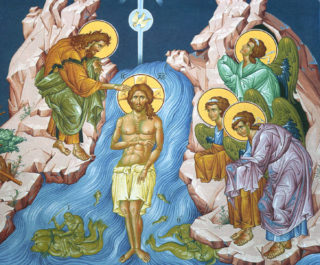 The Epiphany is one of the oldest feasts of the Church. During it, the baptism of Christ is celebrated, which was followed by Ηis three years of public life, Ηis teaching, Ηis Passion and his Resurrection. For Christians in the West the Epiphany marks the enlightenment of humanity with the entry of God into the history of mankind. “O Christ our God, Who hath appeared and enlightened the world” is the final phrase of the Apolytikion of the celebration. And the people of God gave to the feast the name of the Light, because Christ enlightened the world with his epiphany. In remembrance of the event of baptism, the Church established the service of sanctification of the waters, which for centuries takes on a festive character in places near the sea, lake or river. This tradition was respected by our conquerors, even those of other religions. The people of God took care to bring a vessel to the church for the reception of the holy water. They used this to sanctify not only their family members, but also their animals and fields, their houses, and even their filthy stables, so that everything would have God's blessing. And they maintained stock for use throughout the year by adding water. And they did not hide their satisfaction that the holy water remained unaltered, which is a sign that our faith is alive, unlike others, even other Christian denominations.
The Epiphany is one of the oldest feasts of the Church. During it, the baptism of Christ is celebrated, which was followed by Ηis three years of public life, Ηis teaching, Ηis Passion and his Resurrection. For Christians in the West the Epiphany marks the enlightenment of humanity with the entry of God into the history of mankind. “O Christ our God, Who hath appeared and enlightened the world” is the final phrase of the Apolytikion of the celebration. And the people of God gave to the feast the name of the Light, because Christ enlightened the world with his epiphany. In remembrance of the event of baptism, the Church established the service of sanctification of the waters, which for centuries takes on a festive character in places near the sea, lake or river. This tradition was respected by our conquerors, even those of other religions. The people of God took care to bring a vessel to the church for the reception of the holy water. They used this to sanctify not only their family members, but also their animals and fields, their houses, and even their filthy stables, so that everything would have God's blessing. And they maintained stock for use throughout the year by adding water. And they did not hide their satisfaction that the holy water remained unaltered, which is a sign that our faith is alive, unlike others, even other Christian denominations.
Centuries passed. The West was detached from the body of the one, holy, catholic Church of Christ. The faith was altered, the image of the person was distorted. The ascetic view of life and traditions were devalued. Intellectualism under the influence of philosophical reflection “created a building” which didn’t have the teaching of Christ as its foundation. The consequences were painful. Freedom in Christ was replaced by the regime of feudalism and the "Inquisition", and the enlightenment of Christ was replaced, admittedly by most, by the darkness of the Middle Ages.
And when arbitrariness reached extreme manifestations, it provoked reaction, which manifested itself in the so-called religious reform. A feature of this was not the search for the truth lost in the realm of despotic papacy, but the arbitrary course which was not based on the tradition of the Apostolic Church that was ignored in the West, but on the personal beliefs and perceptions of the reformers. And the new fallacy proved to be worse than the first, as evidenced by the multi-fragmentation in the field of reformers and the unstoppable multiplication of their "churches"! They boasted that in "rationality" they built the "true" faith in Christ. That is why they were adversaries and particularly hostile to local traditions, which they collectively rejected as superstitions of the so called "dark" past!
The delusion of Western Christianity lies in its foundation in intellectualism and "rationalism", with which they believed they could persuade non-Christians to accept the faith of Christ, in essence their own faith. Thus their edifice, without Christ being its foundation, was swept away and fell by storm during the age of the so-called "Enlightenment". It was preceded, during the so-called "renaissance", the questioning of the authority of God's "representative" on earth. This was followed by the questioning of God himself as the God of history. He was initially repelled in the "heavens", as a God indifferent to his creatures, to be led to non-existence, which Nietzsche tragically proclaimed with the cry "God is dead"! The "god-killers" became gods themselves and undertook the task to illuminate the world with their own "lights", those of the "enlightenment"! And the world has since moved by the arrogance of the administrators of the soul-damaging experiment. They reassure the masses that everything is going well and that there is no need for concern, as they know too well how to manage the crises that they themselves cause! Selfishness does not allow them to shout Goethe’s (from the monologue of "Faust").
“I 've studied now Philosophy
And Jurisprudence, Medicine, -
And even, alas! Theology,
From end to end, with labor keen;
And here, poor fool! with all my lore
I stand, no wiser than before.
We, too, were dazzled by the "lights" of the West, when, after bloody sacrifices, we re-tasted the illusion of national freedom. According to Makrygiannis, our west-stricken compatriots, in the service of our foreign "protectors", conveyed the "lights" of Western Europe to our country as well, in order to illuminate us. Our people resisted this change/alteration with all the strength they had under slavery. In the end, they seem to succumb, accepting that "we belong to the West" and all the change that this brings with it as something inevitable. Our slavish attitude to everything that is foreign reveals the discrediting of our tradition. In fact, we brag foolishly: "We can live without Christ! Our planet is flooded with lights! It is high time we walked the path of "progress" opened by the people of the West, the "enlightened ones"!
When will we ever feel our spiritual darkness? I wonder…
Copyright © 2021 by Orthodox Christian Association «ΧΡΙΣΤΙΑΝΙΚΗ ΕΛΠΙΣ» ΟΡΘΟΔΟΞΗ ΑΔΕΛΦΟΤΗΤΑ. Used by permission. All rights reserved.
Translation from the book:
Στεργίου Ν. Σάκκου, Ἀληθῶς ἀνέστη ὁ Κύριος,
ἐκδ. «ΧΡΙΣΤΙΑΝΙΚΗ ΕΛΠΙΣ» ΟΡΘΟΔΟΞΗ ΑΔΕΛΦΟΤΗΤΑ, ἔκδ. 3η, Θεσ/νίκη 2007, σσ. 160-164
(Stergios N. Sakkos [Read CV], The Lord is truly risen, pp. 160-164)
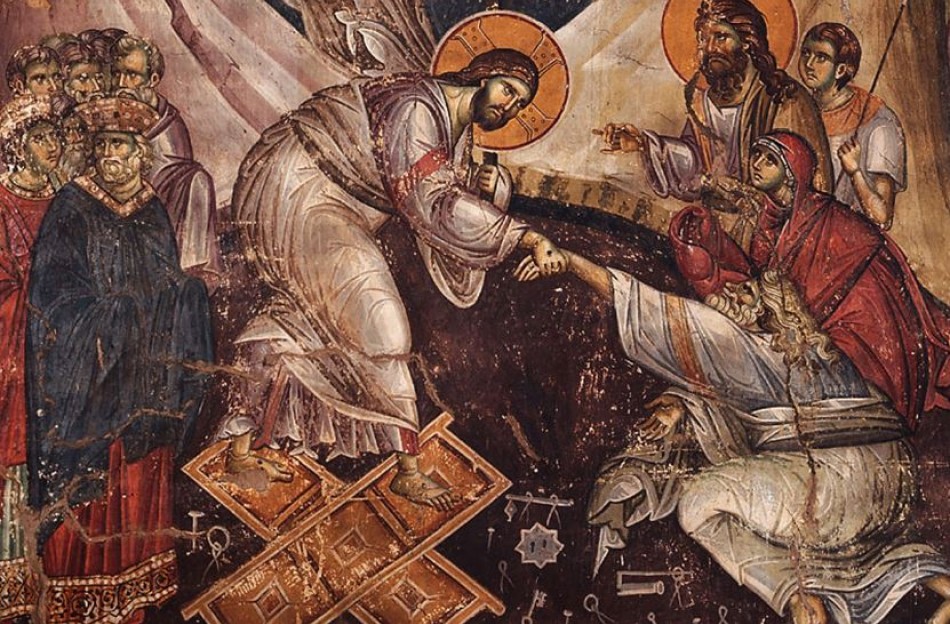 First of all, I will present a trial which, in fact, remains unknown. The high priests, the Pharisees and the Roman authorities, represented by Pilate, tried in every way to keep this out of the public eye. The evangelist Matthew saves a few but clarifying facts about this trial in some verses of the last two chapters of his Gospel. It is the trial of some soldiers of this guard, the sixteen-member Roman guard, which were under the jurisdiction of the religious leadership of the temple. With Pilate’s permission, this guard was placed outside Jesus’ grave by the Pharisees and the high priests. As a result, the disciples would not be able to steal the dead body and then spread the news that He was resurrected.
First of all, I will present a trial which, in fact, remains unknown. The high priests, the Pharisees and the Roman authorities, represented by Pilate, tried in every way to keep this out of the public eye. The evangelist Matthew saves a few but clarifying facts about this trial in some verses of the last two chapters of his Gospel. It is the trial of some soldiers of this guard, the sixteen-member Roman guard, which were under the jurisdiction of the religious leadership of the temple. With Pilate’s permission, this guard was placed outside Jesus’ grave by the Pharisees and the high priests. As a result, the disciples would not be able to steal the dead body and then spread the news that He was resurrected.
The tomb was secured “the next day, the one after Preparation Day” (Mt 27:62). These fanatical supporters of the Law about Sabbath did not even respect the Sabbath day. Why? Because they dreaded the Resurrection. They remembered that “while he was still alive that deceiver said”, while Jesus was still alive – therefore, they themselves confirmed that he was dead – He had said that “after three days I will rise again” (Mt 27:63). Although, the disciples did not keep in mind this prophecy at all, Jesus’s enemies and crucifiers were the only ones who believed it and they took every precaution to prevent its fulfillment. Indeed, with Pilate's approval, the high priests and Pharisees – after being sure that the dead body was inside - secured the tomb by putting a seal on the stone (Mt 27:66). What purpose did seals serve? They protected the tomb from the guards, while the soldiers guarded the tomb from the disciples or anyone else who would attempt to steal Jesus' dead body. The tomb was secured and the soldiers guarded the tomb. Now the high priests of Israel could sleep peacefully and “eat the Passover” happy and legally clean, free from sin (see Jn 18:28).
Their peace, however, was disturbed by the presence of these soldiers in Jerusalem the next morning, “on the first day of the week” (Mk 16:2). The high priests and elders were assembled and “had taken counsel” to judge the custodian guards. In their testimony, the soldiers reported to the chief priests everything that had happened (Mt 28:11-12). Being faithful to the mission assigned to them, they guarded the tomb. But at dawn “on the first day of the week”, after a terrible earthquake, they realized that the tomb was empty. How did that happen? They were unable to explain it. However, the high priests and elders understood it very well. Yes, despite the draconian measures they took, the prophecy of the “deceiver” was verified (Mt 27:63). Jesus Christ was risen. Therefore, he was not a deceiver but they themselves were deceived. How could they admit it, though? How could they confess it to the people? They would have to recant what they had said. For this reason, they find a formula which covers them, at least for the time being. They bribe the soldiers with “a large sum of money” (Mt 28:12), telling them, “You are to say, ‘His disciples came during the night and stole him away while we were asleep.’” (Mt 28:13).
For Roman soldiers to fall asleep while on duty was a serious offense and punishable by death. What did the Roman ruler Pilate have to say about this? Normally, he should have beheaded the soldiers after the interrogation, as Herod did a little later, when an angel of the Lord released the imprisoned Apostle Peter. He “interrogated the guards and sentenced them to death” (Acts 12:19). Why was Pilate silent? Why did he not apply the law? The question was answered by the judges of these soldiers, the high priests, who assured that “If the governor hears about it” -the alleged negligence of the soldiers- (Mt 28:14), they would intervene themselves to convince him not to punish them. It is not difficult to understand how the high priests would achieve this. Bribery and blackmailing were the usual ways in which conquered peoples influenced conquering Romans.
So, the soldiers “took the money and did as they were instructed” (Mt 28:14), that is, they said that the disciples stole Jesus’ dead body of while they were sleeping. However, the testimony of the soldiers is not only unconvincing, but it also offends the judges-high priests. Saint Augustine aptly observes (Enarrationes in Psalmos 63, 15· Corpus Christianorum 39, 817) “Sleeping witnesses ye adduce: truly you yourself hast fallen asleep, that in searching such devices hast failed. If they were sleeping, what could they see? If nothing they saw, how are they witnesses? But they failed in searching searchings: failed of the light of God, failed in the very completion of their designs: when that which they willed, nowise they were able to complete, surely they failed”. If the judges relied on the words of the sleeping soldiers, they affirm that they made plans to deceive us. How did the soldiers, while sleeping, see that the disciples stole Jesus' body? If, on the other hand, they saw nothing, then what did they testify? Their testimony sounds as if they said: we testify that Jesus' disciples stole his body. Our testimony is completely indisputable, because at the time when the students were stealing the body, we were sleeping so deeply that we neither heard nor saw anything!
The result of the trial is that the “large sum of money” closed the mouths of the soldiers. But they were not able to keep the empty tomb closed, to prevent “the stone rolled away from the tomb” (Lk 24, 2) from revealing to the guards, to the crucifiers and to the whole world that Christ is Risen.
Copyright © 2021 by Orthodox Christian Association «ΧΡΙΣΤΙΑΝΙΚΗ ΕΛΠΙΣ» ΟΡΘΟΔΟΞΗ ΑΔΕΛΦΟΤΗΤΑ. Used by permission. All rights reserved.
JESUS CALLS HIS FIRST DISCIPLES (Lk 5:1-11)
Γράφτηκε από Super UserTranslation from the book:
Στεργίου Ν. Σάκκου, Ἑρμηνεία στό κατά Λουκᾶν Εὐαγγέλιο, τόμ. Α΄, ἐκδ. «ΧΡΙΣΤΙΑΝΙΚΗ ΕΛΠΙΣ» ΟΡΘΟΔΟΞΗ ΑΔΕΛΦΟΤΗΤΑ, Θεσ/νίκη 2008, σσ. 207-216. (Stergios N. Sakkos [Read CV], A Commentary on the Gospel according to Luke, vol. A', pp. 207-216)
At the beginning of his public life, Jesus invited the disciples who would follow him and afterwards they would continue his work. The Evangelist Luke, who, as it was said (see comments on 1:3), does not respect the chronological order of events, writes first about certain incidents that took place later. So, at the end of the previous chapter (see 4:31-44) we read about a healing, in the synagogue of Capernaum, of a man who had demons in him, the healing of Peter's mother-in-law from a high fever and other miracles. And then (5:1-11) he writes about the call of the disciples, considering it as the most important event of the first days of Jesus in Capernaum. For this reason, he describes it in detail, while Saint Matthew and Saint Mark omit it in their short narratives (see Mt 4:18-22; Mk 1:16-20).
5:1 And it came to pass, that, as the people pressed upon him to hear the word of God, he stood by the lake of Gennesaret.
One day as Jesus was standing by the Lake of Gennesaret, the people were crowding around him and listening to the word of God.
Jesus did not come from the circle of Pharisees whom the people almost feared. He was simple and accessible to the ordinary people. He spoke clearly and simply. He could be perceived by the crowd, while the High-priests and the Pharisees spoke about Him contemptuously (see Jn 7:48-49). The religious leadership of the Jews and those who had high social positions, being poisoned by their selfishness and self-sufficiency, did not feel the need to hear God’s word. For this reason, Jesus preached on the shore of Capernaum - this was probably the market of the city - where a lot of fishermen and other simple people, the chosen remnant of God (cf. 1 Cor 1:26-28), were gathered. They were all crowded, as the verb «ἐπικεῖσθαι» «pressed upon him» states, in their attempt to approach Jesus and hear his teaching.
Lake Gennesaret took its name from the adjacent homonymous plain. The same lake is mentioned in the book of Num 34:11 with the name «Henereth (kinyra)», apparently because of its shape, which looked like the musical instrument kinyra, the well-known harp. Because of its great size, the Jews called Gennesaret the «sea». So, in the Gospels we find it as the «Sea of Galilee» (Mt 4:18; 15:29; Mk 1:16; Jn 6:1) because it was in the area of Galilee (Jn 6:1; 21:1), or the «Sea of Tiberias» because the city of Tiberias was built at its shore in honour of the Emperor Tiberius. In contrast to the other three evangelists, Luke describes it as a lake, because he is addressed to believers who were not from Palestine and did not know the local use of its name.
5:2 And saw two ships standing by the lake: but the fishermen were gone out of them, and were washing their nets.
He saw at the water’s edge two boats, left there by the fishermen, who were washing their nets.
When the crowds surrounded Jesus, there were two fishing boats nearby. These were small boats that were used in professional fishing. They were about 8 meters long and 2 meters wide and could carry a weight of about one ton.
In this lake there was a huge quantity of diverse fish. The fish, as we can see from its frequent reference in the Gospels (Mt 14:15-21; 15:32-39; 17:24-27; 6:35-44; 8:1-10), was the basic diet of Hebrews. So, it was natural for the inhabitants of the towns and villages near the lake to occupy themselves with fishing. The fishermen of the two boats had come ashore and after the fishing that had preceded during the night (see verse 5), they washed and mended their nets. Therefore, it was morning or at least before noon. Fishing was primarily done with nets. There were a variety of nets. The gospel narratives refer to the «ἀμφίβληστρον» (see Mt 4:18; Mk 1:16), the «charm» (Mt 13:47) and the long nets like the contemporary ones, with corks on the top and weights on the bottom. This last type of net, as we can see by the way they fished (see verse 6), was used by the fishermen of our passage.
5:3 And he entered into one of the ships, which was Simon's, and prayed him that he would thrust out a little from the land. And he sat down, and taught the people out of the ships.
He got into one of the boats, the one belonging to Simon, and asked him to put out a little from shore. Then he sat down and taught the people from the boat.
Jesus asked for Peter's consent to use one of the two boats as a teaching platform. He made a polite request to him, knowing that he was the owner. This detail shows how much the Lord respected the freedom of any man and the right for property. The verbs «ἀνάγειν» and «κατάγειν» as nautical terms mean respectively «I’m going out into the sea» and «I’m bringing the ship to the shore». The verb «ἐπανάγειν» means «I'm going back to the sea». Jesus asked Peter to remove the ship only a few meters from the shore, so that the water would become a natural barrier between him and the crowd, who were gathered around him. In this way, everyone could see and hear him better.
Peter willingly made his ship available for the Teacher to preach. He did not hesitate because of the fatigue of the whole night or his sorrow for the unsuccessful fishing. He himself longed to hear God’s word from Jesus. About the phrase «he sat down, and taught the people» see comments on 4:20.
5:4 Now when he had left speaking, he said unto Simon, launch out into the deep, and let down your nets for a draught.
When he had finished speaking, he said to Simon, «Put out into deep water, and let down the nets for a catch.»
The Lord did not want to leave without paying the owner of the ship, who offered him this unusual pulpit. At the end of the speech, he urged him to bring the ship again to the depths of the lake and with the other fishermen to let the nets down for fishing. He had, after all, his plan; through fishing he could «catch» disciples, according to the pun of Saint Cyril of Alexandria. He wanted to gain the absolute trust of his first disciples and attract them by showing his divine power.
5:5 And Simon answering said unto him, Master, we have toiled all the night, and have taken nothing: nevertheless at thy word I will let down the net.
Simon answered, «Master, we’ve worked hard all night and haven’t caught anything. But because you say so, I will let down the nets.»
The Lord was not a fisherman. As a man, he was unskilled at this job. His order would certainly seem absurd to Peter, who knew that this time of the day was completely inappropriate for fishing. And yet, excited by the presence and preaching of Jesus, the experienced fisherman obeys to this curious exhortation. He calls him «ἐπιστάτα», which means «teacher.» Luke uses this word instead of the Hebrew «rabbi», which is preferred by the other evangelists. It is not known if Peter had already watched Jesus doing other miracles. It is certain that he knew him since his brother Andreas had introduced him (see Jn 1:42-43). Peter's direct response to the Lord's command reminds us the willing obedience of the Virgin Mary to the angel's message (Lk 1:38) and it is a great lesson for the believers of all ages. His decisive answer, «because you say so, I will let down the nets», is often repeated by those who submit to the Lord's will, even when it seems unreasonable, and trust Him.
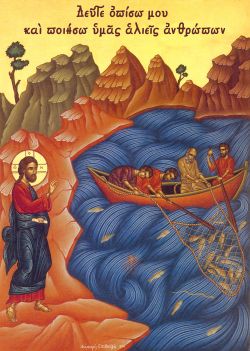 5:6 And when they had this done, they inclosed a great multitude of fishes: and their net brake.
5:6 And when they had this done, they inclosed a great multitude of fishes: and their net brake.
When they had done so, they caught such a large number of fish that their nets began to break.
There were so many fish gathered, that the net «διερρήγνυτο». This verbal type, states that the net was about to break. Jesus, as an almighty God, dominates everything. His will and the power of his word attained this miraculous fishing, which cannot be rationally explained. There is also a miraculous fishing in Jn 21:3-14. But this is not the same incident. There, the resurrected Lord appeared «in another form» (Mk 16:12) and repeated the same miracle as a proof of his identity and as a sign of recognition by his disciples.
5:7 And they beckoned unto their partners, which were in the other ship, that they should come and help them. And they came, and filled both the ships, so that they began to sink.
So they signaled their partners in the other boat to come and help them, and they came and filled both boats so full that they began to sink.
The word «κατένευσαν» is a maritime term, which in Modern Greek means «signal». When the boats were at a great distance from each other, the sailors could communicate by waving their hands or by a piece of cloth or some other visible signal. Peter's boat was out farther in the lake, while his partners’, the sons of Zebedee’s boat, was on the shore. For this reason, they could only communicate with signals.
Since both boats were filled, it seems that there were too many fish and the boats were relatively small. The type of the phrase, «ὥστε βυθίζεσθαι», does not mean that the boats started sinking, but because of the weight were about to sink. Their displacement «εκτόπισμα», in other words, crossed the line of safety. Some foreign scholars ignored the precise interpretation of these two words, so they faced the following speculations: How did the disciples finally catch the fish, since the nets were destroyed by the weight? How did they save the boats from being sank? The more precise meaning is that they «were about to sink» and this answers the above questions.
5:8 When Simon Peter saw it, he fell down at Jesus' knees, saying, «Depart from me; for I am a sinful man, O Lord.»
When Simon Peter saw this, he fell at Jesus’ knees and said, «Go away from me, Lord; I am a sinful man!»
The reference to the double name Simon Peter helps us to understand that the evangelist has in his mind the first contact of Peter with Jesus, when the Lord said to him; « you will be called Cephas, which means, Peter», which John records in Jn 1:43. There is, therefore, no disagreement between John and the other three evangelists over the election of the disciples, as some have claimed. John describes the first acquaintance; the others presuppose it and mention the call of the first disciples and later the final chosen ones for the missionary group, that is, the election of the twelve and their mission (see Mt 10:1-4; Mk 3:13-19; Lk 6:13-16).
The miraculous fishing revealed the divine power of Jesus. In the face of this revelation, Peter is shocked. He contrasts his own weakness and sinfulness to his majesty and sanctity and spontaneously calls him «Lord». Peter realizes how small and unworthy he is to host Jesus on his boat. Kneeling with devoutness, he exclaims; «Go away from me, Lord; I am a sinful man!» His spontaneity does not allow him to think how unreasonable his request is, since Jesus should fall into the sea in order to get out of his boat. It is also a detail that proves this is a true narrative and not a fiction.
5:9 For he was astonished, and all that were with him, at the draught of the fish which they had taken.
For he and all his companions were astonished at the catch of fish they had taken,
The miraculous fishing left the fishermen dazzled, not of course for the unexpected wealth that it would probably bring, but as a supernatural event, which showed the presence of an omnipotent person.
5:10 And so was also James, and John, the sons of Zebedee, which were partners with Simon. And Jesus said unto Simon, «Fear not; from henceforth thou shalt catch men.»
and so were James and John, the sons of Zebedee, Simon’s partners. Then Jesus said to Simon, «Don’t be afraid; from now on you will fish for people.»
The professional fishermen of the lake usually formed guilds, small fishing companies. Their members were called «shareholders» (see vs. 7) or «κοινωνοί». They participated in the company offering their boats, nets and labor, and «shared» the profits. The two pairs of brothers: Petros-Andreas, James-John had created such a company.
The Evangelist Luke mentions the names of the three of the four partners, Peter, James and John. It omits Peter's brother, Andrew, who is mentioned by the other two evangelists (see Mt 4:18; Mk 1:16). His purpose, obviously, was to inform his recipients how the three top disciples, whom Jesus took with him at key moments of his earthly life, were invited. These were in the resurrection of the daughter of Jairus (Mk 5:37; Lk 8:51), in Transfiguration (Mt 17:1; Mk 9:2; Lk 9:28), in Gethsemane (Mt 26:37; Mk 14:33). The Lord urges Peter «Don’t be afraid» and reassures him, as in the past the angel Gabriel said to Zacharias (see Lk 1:13) and to the Virgin Mary (see Lk 1:30). The presence of God in Sinai (cf. Ex 19:16-18; 20:18) and more generally in the history of Israel, was accompanied by phenomena that caused the terror of the Israelis. In the years of the New Testament, God came to banish fear and make people shareholders in the happiness of his kingdom.
The verb «ζωγρῶ» refers to the captivity of living beings. Peter is called to change not his profession but the object of his fishing. Instead of catching fish in his nets and lead them to death, he will capture people from the sea of the world, where they are spiritually dead, and lead them to eternal life. The superiority of his imminent mission is obvious.
5:11 And when they had brought their ships to land, they forsook all, and followed him.
So they pulled their boats up on shore, left everything and followed him.
The blessed fishermen were impressed by the rich catch, but they did not want to profit from it economically. The desire for profit did not stand as an obstacle to Jesus’ call; «left everything» and they followed him. They were called to a mission that demanded self-denial and absolute devotion. That day Jesus broke up a fishing company and gained the first shareholders of his own divine «Company».
In the election of the students there is an element which is strongly at contrast to the tactics used by the leaders of various movements. These seek out their fans among the unemployed and unoccupied. The Lord called his colleagues while they were working (cf. Ex 3:1-4; 1 Kings 19:19-21). In this way, he showed how he honors work. Moreover, he did not consider it disrespectful to be described as a «τέκτων» (see Mt 13:55; Mk 6:3) i.e. a craftsman (carpenter, construction worker, blacksmith).
The evangelists Matthew and Mark note with emphasis that the four fishermen «straightway» left everything, in order to follow Jesus (see Mt 4:20.22; Mk 1:18.20). St. John the Chrysostom praises their obedience and urges: «This is the obedience Christ is asking from us», that is, to do the will of the Lord without the slightest delay.
Very often we develop a great activity for earthly things, while we constantly postpone everything that has to do with our spiritual life and the case of God. This delay is a well-made trap of evil. It is written, in this connection, by the former bishop of Florina Augustine: «All, dear ones, let us fear the demon of delay. In every good decision about the glory of God or for the benefit of our neighbor, he comes and whispers to us; “Tomorrow”. Oh, the cunning creature! He promises the uncertain future and seizes the present... Let us not forget the wisdom of a saying that the road to hell is paved with numerous “wills” and kind promises which will never be realized.»
In all ages the Lord appeals to everyone the invitation to follow him; to abandon the life of sin and to walk faithfully on his own footprints (see 1 Pet 2:21; cf. Col 3:8-10). At the same time, every Christian is called to be a missionary in his environment. The motto of the first Christians was: «Εις προς ένα προς ΙΧΘΥΝ», «Each one approach another one to bring him to Jesus Christ God’s Son». We know that the Christian merchants who traveled to the countries of the Mediterranean, contributed a lot to the spread of the Gospel. The Church of Rome, for example, was founded by disciples of the Apostle Paul who had moved there, before the apostle arrived. «The person who has no missionary desires, is a false Christian,» writes the bishop Augustine categorically.
However, in addition to the general call, the Lord also directs special calls to some persons in order to take up the special mission to continue the work of the Apostles. In every era, it is necessary to exist the tireless fishermen, the teachers of the gospel, those who will sacrifice their careers. They will cut off all human emotional ties and throw themselves with a spirit of sacrifice into the missionary work inside or outside their homeland. The Lord, emphasizing this need, urges the faithful; «Pray you therefore the Lord of the harvest, that he will send forth laborers into his harvest» (Mt 9:38).
The miraculous fishing can be paralleled with the work of the Church. The rich catch was a type of the rich fishing of men, a foretelling of the large crowd of those who were to be caught by the nets of the Apostles. By the power and authority of the Lord, with the patience and insistence that characterizes the fishermen, the apostles really spread the nets of the gospel and arrested a lot of men, whom led to Christ and salvation.
Copyright © 2021 by Orthodox Christian Association «ΧΡΙΣΤΙΑΝΙΚΗ ΕΛΠΙΣ» ΟΡΘΟΔΟΞΗ ΑΔΕΛΦΟΤΗΤΑ. Used by permission. All rights reserved.
Translation from the book:
Στεργίου Ν. Σάκκου, Ὁ ληστής θεολόγος καί δάσκαλος,
ἐκδ. «ΧΡΙΣΤΙΑΝΙΚΗ ΕΛΠΙΣ» ΟΡΘΟΔΟΞΗ ΑΔΕΛΦΟΤΗΤΑ, Θεσ/νίκη 2009, σσ. 38-42
(Stergios N. Sakkos [Read CV], The Criminal-Robber: Theologian and Teacher, pp. 38-42)
A Christology Lesson
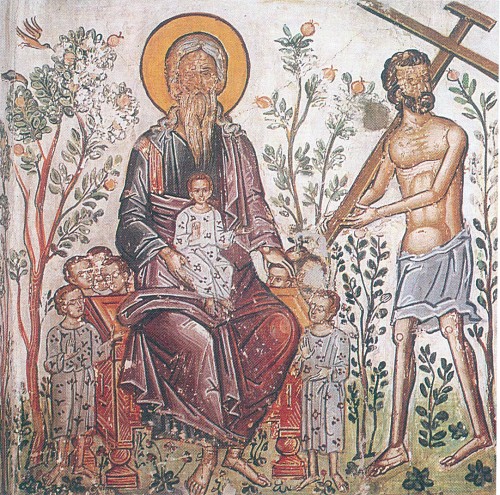 The criminal-robber, as if he were a theologian, declares that Jesus Christ is sinless. This is an old and well-known issue which is proved by the testimonies of the Scriptures.
The criminal-robber, as if he were a theologian, declares that Jesus Christ is sinless. This is an old and well-known issue which is proved by the testimonies of the Scriptures.
• About 750 years BC the prophet Isaiah stated: “because he had done no violence, neither was any deceit in his mouth” (53:9). “Although he had done no violence and had said nothing deceptive”.
• The question Jesus himself asked remains unanswered: “Which of you convinceth me of sin?” (Jn 8:46). “Who among you can show I’m guilty of sin?” Through the centuries many people tried to criticize Christ, but they couldn’t find any fault. Jesus remains faultless, flawless, the only one who is sinless (pure).
• Pilate himself confessed so, after he had interrogated him: “I am innocent of the blood of this just person” (Mt 27:24)
• Pilate’ wife testified that after her dream: “Have thou nothing to do with that just man: for I have suffered many things this day in a dream because of him.” (Mt 27:19) “Leave that righteous man alone. I’ve suffered much today in a dream because of him.”
• It is, also, verified by the Pharisees and Sadducees who stood silent in surprise when those sent to arrest Jesus, admitted: “Never man spake like this man” (Jn 7:46). “No man ever spoke like this!”
• And there it is! The last minute, a criminal on the cross, a robber, declared that: “but this man hath done nothing amiss” (Lk 23:41). “But this man has done nothing wrong.” St Cyril of Jerusalem says that there is “another witness of the fact that Jesus is sinless, ‘the first criminal in paradise’”.
The man who spent his whole life committing offences and crimes perceived that Jesus did not commit any offence or anything illegal. So, he publicly and without any hesitations declared that Christ was innocent. He was not affected by the Pharisees and by those who condemned Him. It is as if we read texts from Isaiah, Baruch, Habakkuk “His glory covered the heavens, and the earth was full of his praise.” (Hab 3:3). The criminal’s historic public confession is another testimony of the fact that our beloved Jesus is sinless. When we are aware of that, we appreciate the greatest gift of His Passion for us. The One who is sinless suffers for me, the sinner.
Along with the admission that Christ is sinless, the criminal, also, acknowledged His divinity and declared in his prayer that He was the Lord. So, he asserted that the man who was hanging on the cross next to him was not a common criminal. He was the God Himself who had incarnated and come among men. The advanced Christology of this criminal–theologian is the same as St Paul’s preaching: “that God was in Christ, reconciling the world unto himself” (2 Cor 5:19).
The apostle Thomas, also, confessed that Jesus Christ was his Lord and God (Jo 20:28), but he had already lived for three years in the company of the Teacher and the other disciples and when he said so, he could see the Lord resurrected in front of him. The criminal discerned Jesus’ divinity before the Resurrection and it was not in a moment that the divine power was revealed. He watched Jesus at his most hard time: He was betrayed by His disciple, abandoned by His friends, reproached and condemned by those in power and He was already on the cross. He watched Him dying but he still believed that He was the Lord and He had a Kingdom. He believed that the cross and death did not put an end but inaugurated His Kingdom.
In the Holy Scriptures there are many cases of people whose faith makes them stand out. The faith of Abraham, Moses, Daniel and others in the Old Testament is impressive. They proved their faith to God. However, the case of this criminal is unique, one and only. We cannot deny that since the world was created no one else revealed this kind of faith.
I kneel in front of this criminal’s cross as well. I admire him and thank him humbly, because he offers a valuable confession for our modern times. Atheist writers publish blasphemous articles and books. There are also, films based on those books that try to offend our innocent and sinless Lord. Today we need that criminal’s public confession. We need to hear him declaring the undeniable truth that Jesus is the sinless God!
Copyright © 2021 by Orthodox Christian Association «ΧΡΙΣΤΙΑΝΙΚΗ ΕΛΠΙΣ» ΟΡΘΟΔΟΞΗ ΑΔΕΛΦΟΤΗΤΑ. Used by permission. All rights reserved.
Translation from the article:
Στεργίου Ν. Σάκκου, Γιά μιά εὐλογημένη Μ. Σαρακοστή, περιοδ. "Ἀπολύτρωσις".
(Stergios N. Sakkos, University Professor [Read CV])
March is usually marked by the period of Lent. The Church opens before us the “stadium of virtues”. At the same time, it undertakes the role of an experienced trainer who is responsible for the athletes in the spiritual realm. Showing total respect towards our freedom, it announces the beginning of the “race”: “Enter those of you who are willing to fight!”
From the numerous spiritual “sports events”, available to us during Lent, I would like to underline two: abstinence and humility. Of course, they sound strange in our time which is dominated by self-indulgence and arrogance. Convenience, in a society of overconsumption, abolished ascetic life. The main purpose and vision in our life seems to be just enjoying ourselves. On the other hand, our selfishness abhors any sense of humility.
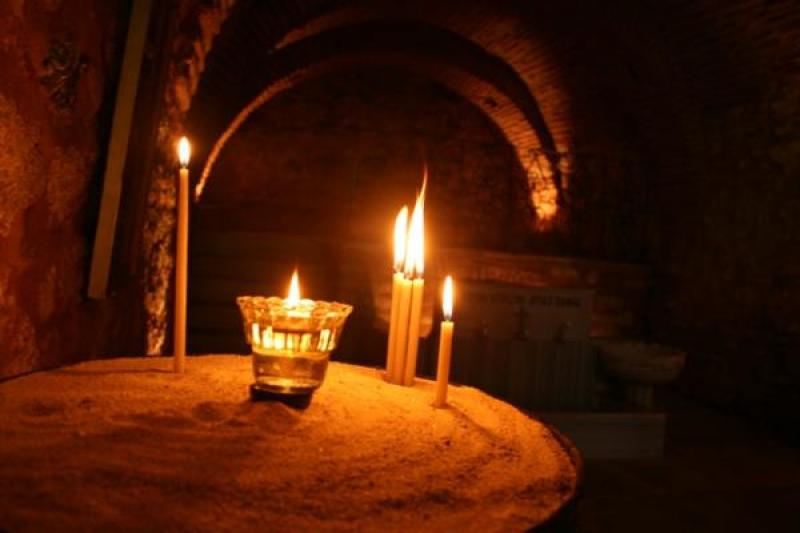 However, abstinence and humility or fasting and confession – as experienced in the Orthodox Church – are the two authentic acts of piety. Today, in our faith, everything has been simplified yet two things remain challenging: genuine fasting and sincere confession. The former has an impact on the body, not in order to exhaust or harm it but to renew it. The latter humbles the soul in order to recover its divine glory. It eradicates selfishness and arrogance which deviously dominate our life. When we participate voluntarily and with honesty in these two spiritual “events”, our life is marked by the sign of the Cross. It transforms us into authentic disciples, following the example of the crucified Lord, Jesus Christ.
However, abstinence and humility or fasting and confession – as experienced in the Orthodox Church – are the two authentic acts of piety. Today, in our faith, everything has been simplified yet two things remain challenging: genuine fasting and sincere confession. The former has an impact on the body, not in order to exhaust or harm it but to renew it. The latter humbles the soul in order to recover its divine glory. It eradicates selfishness and arrogance which deviously dominate our life. When we participate voluntarily and with honesty in these two spiritual “events”, our life is marked by the sign of the Cross. It transforms us into authentic disciples, following the example of the crucified Lord, Jesus Christ.
It is true, of course, that both abstinence and humility demand the transcension of our ego. Without doubt, the entire life of the faithful is a way of transcendence. The believer overcomes his personal will in order to obey God’s will. Without neglecting the present life, the believer transcends it to embrace “eternity”, as the Church is called.
What is impressive though, is that whoever makes eternity his priority, makes the most of the present life as well. This is because our real interest lies in what God’s law prescribes. Especially concerning fasting and confession, I could wholeheartedly recommend it as what today’s people definitely need. At the time of Saint Vasilios, medicine admitted that fasting was the foundation of a healthy lifestyle. What is more, the wisdom of our Fathers attributed human harmony to humility and sincere confession. Nowadays, these benefits are obvious from the other side, too. Heart disease, strokes and so many other diseases as a result of self-indulgence, stress, anxiety and all sorts of addictions seem like an epidemic. This is a very serious issue that forces us to admit that if we were more restrained and ascetic, if we were more honest with ourselves and God, we would be healthier both physically and mentally.
Indeed, our Church has designed a life chart for its members, so they can benefit not only in eternity but in the present life as well. Fasting and confession help people improve themselves and be purified both as individuals and as members of a social group. Fasting, abstaining from certain types of food and from vices and desires, is described by St. Chrysostom as the “mother of well-being”. It helps our body detox offering physical strength. It purifies our soul by turning our mind to God and stimulates our love, since it is connected to almsgiving/charity. “Let’s fast in order to be charitable” is the slogan of the Church. Confession helps people to make peace with themselves, restores their relationship with other people and allows them to enjoy God’s friendship and love. St. Chrysostom urges us “not to feel ashamed to confess our sins, since confession is a powerful force”.
Especially, the period of Lent becomes a guide to the paths of ascetic life and humility. During Lent the Orthodox Church suggests a series of transcendental spiritual exercises, which are similar to that of a pole used by a pole-vaulting athlete, in order to win. Will we dare such a transcendence of our ego? Certainly, this is the only way that safely leads to the resurrection.
Copyright © 2021 by Orthodox Christian Association «ΧΡΙΣΤΙΑΝΙΚΗ ΕΛΠΙΣ» ΟΡΘΟΔΟΞΗ ΑΔΕΛΦΟΤΗΤΑ. Used by permission. All rights reserved.
Translation from the article:
Εὐαγγέλου Ἀλ. Δάκα, Πορεία σταυρική, περιοδ. "Ἀπολύτρωσις" 75 (2020) 68-69
(Evangelos Al. Dakas PhD in Theology and Philologist)
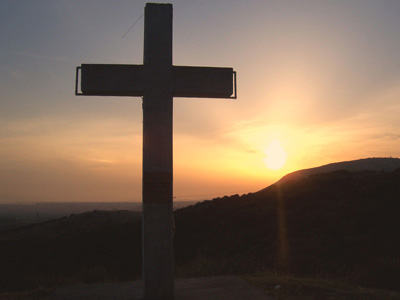 Lent is a path to crucifixion. In order to reach Holy Easter and experience the Resurrection of Christ - the most desirable dream of mankind - the faithful must first be crucified, like Him, there is no other way. If they really want to enjoy the life of the Lord, they must also participate in His death. We are not superior and more competent than our Lord. Since He walked towards His death, although He could have avoided it, it is our duty to do exactly the same (see Mt 10:24 and 1 Pet 2:21).
Lent is a path to crucifixion. In order to reach Holy Easter and experience the Resurrection of Christ - the most desirable dream of mankind - the faithful must first be crucified, like Him, there is no other way. If they really want to enjoy the life of the Lord, they must also participate in His death. We are not superior and more competent than our Lord. Since He walked towards His death, although He could have avoided it, it is our duty to do exactly the same (see Mt 10:24 and 1 Pet 2:21).
However, how does one die with Christ? How does the Cross of our Lord become an experience of the faithful?
The first way that leads us to the crucifixion and the tomb along with Christ is certainly repentance. Repentance means denying the life of the antichrist world, something I haven’t done yet, and start obeying the commandments of God. But this choice is a real cross, it is essentially a martyrdom. Two laws are fighting within me: the law of the Spirit and the law of decay. The law of the Spirit requires ascension, labour and toil, while the law of decay is easy and sweet in its taste. I choose the first, but my whole being slips into the second (Rom 7: 14-25). However, if I really want to live with God’s Son and put on His glory, I will not hesitate for a moment; no matter how much it hurts, I will kill the law of corruption and I will be dead for the world (see Ga 6:14).
The second way is prayer. In fact, the period of Lent is mainly a period of prayer, since the Church includes in its daily program numerous, long and particularly “repentant” services. Prayer means getting rid of all I want and my desires, whatever they may be, and submitting my ego to the obedience of Christ. Without a doubt, this is not pleasant for the people, because it means self-denial and quite often humiliation and pain. In specific, our prayer during Lent must repeat the Lord's prayer in Gethsemane: " Father, if you are willing, take this cup from me; yet not my will, but yours be done” (Lk 22:42), and it must have something of its mortal agony, the same sweat and blood (Lk 22:44).
The third way to participate in the mystery of Golgotha is forgiveness. Forgiveness means being able to «συν-χωρώ» that means to be in the same place with the others. That is, to offer something from the vital space of my own self to the ones who have become my enemies, to embrace them, no matter how much they have hurt me. Of course, this is not easy. It certainly presupposes a sacrificial spirit and lots of times it requires from our soul to touch Hades. Yet even this very death was first taught, in a touching way, by the crucified Jesus. The Lord on the Cross, naked, covered in blood and deep in the abyss of pain, forgave and even justified His own crucifiers. “Father, forgive them, for they do not know what they are doing.” (Lk 23:34). We, therefore, have a prototype. We are not called to this martyrdom without guarantees. Before us, God accepted it for Himself, and in fact during His most hard embitterment from His own creature.
A fourth way that leads to the Cross is fasting. Fasting aims to teach us a very basic lesson: that we will never desire the unspeakable goods of heaven, if we remain slaves to the earthly goods of this world. He who fasts becomes a disciple in the Kingdom of God, which "is not a matter of eating and drinking" (Rom 14:17). Certainly, abstinence from food is a torment, a death. And it is no coincidence that the initial fasting of the Church, the forerunner of Lent, was closely connected with the celebration of the Lord's death. When John the Baptist’s disciples asked Jesus why the Pharisees and they themselves fasted, while Jesus’ disciples did not, the Lord Himself prophesied that it is not possible for those who are feasting at the wedding table and have the groom among them, to fast. The time will come when the bridegroom will be taken from them and then they will fast (see Mt 9:14-15). And that time has come. It is the Great Lent. The bridegroom Christ was abducted and led to death, and the marriage was changed into a slaughter.
These four roads are not choices. You can’t choose only the one you like most. All believers must walk consistently on all of them. Sin has sown millions of weeds in our miserable self, that is why varied and hard work is required from the farmer. Therefore, all we have to do is put forth all our forces and get started. Our effort, graceful from the mercy of the Lord, will not take long to blossom all around. And if we fight with the same faith to the end, we will enjoy the glorious and immortal fruit of the resurrection.
Copyright © 2021 by Orthodox Christian Association «ΧΡΙΣΤΙΑΝΙΚΗ ΕΛΠΙΣ» ΟΡΘΟΔΟΞΗ ΑΔΕΛΦΟΤΗΤΑ. Used by permission. All rights reserved.
Translation from the article:
Στεργίου Ν. Σάκκου, Ἡ Ἐκκλησία σχολεῖο Χριστοῦ, περιοδ. "Ἀπολύτρωσις" 63 (2008) 228-230.
(Stergios N. Sakkos, University Profssor [Read CV])
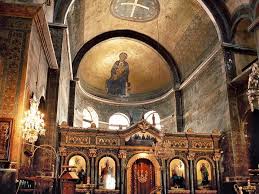 Church is God’s holy family. Its members enjoy the caring love of Father God. They are the appointed heirs of His priceless wealth. They rejoice the bond they share with their first brother, the God-Man Jesus Christ, and their fellow Christians. Church is, also, a holy army. All believers obey the law and orders of “Jesus the author and finisher of our faith” (Heb 12:2). All of them should make good use of the spiritual weapons, which are given to them, to fight bravely the spiritual God-assigned war and proceed to victory. But first of all, they must learn and experience Church as Christ’s school and then obtain the wealth of God’s family.
Church is God’s holy family. Its members enjoy the caring love of Father God. They are the appointed heirs of His priceless wealth. They rejoice the bond they share with their first brother, the God-Man Jesus Christ, and their fellow Christians. Church is, also, a holy army. All believers obey the law and orders of “Jesus the author and finisher of our faith” (Heb 12:2). All of them should make good use of the spiritual weapons, which are given to them, to fight bravely the spiritual God-assigned war and proceed to victory. But first of all, they must learn and experience Church as Christ’s school and then obtain the wealth of God’s family.
Jesus Christ walked on earth as the unique and eternal teacher (Mt 23:8). Teachers, in this world, teach the scientific truths. Science actually improves life, if is applied in a spirit of love (1 Cor 13), and as an ancient philosopher said: if it doesn’t ignore virtue. Also, science contributes to a professional development and success in an earthly career. Christ as a teacher reveals eternal truths that offer freedom, sanctification, salvation and glory and finally lead to a spiritual restoration and eternal improvement. Jesus Christ is the Teacher of truth, the unique “Professor” and the Leader who opens the way and guides people to experience this truth in everyday life.
In the school of Church the book is the Bible, the Holy Scripture: Old and New Testament. The writings of the holy Fathers enable us to have the best understanding of it. They studied and interpreted God’s words and they had a deep experience of them. Fathers were distinguished as Lord’s competent followers and enlightened guides of Christians. The wisdom of their spirit and the holiness of their life made them stand out as a strong fort where every heresy and divergence were crushed.
Lord called “disciples” His first followers. But we know that besides the twelve disciples, there was also a group of seventy men and one even wider. While leaving this world He ordered His disciples to teach people of all nations. “Go and teach all nations……” (Mt 28:19). So, one of the most common names of Christians, used in the Acts of the Apostles, is “disciples”.
Saint Paul calls the Christian faith and Church, “grace” (Rom 5:2, Tit 2:11) and considers it to be a school, God’s educational institution. He writes to his disciple Titus “For the grace of God that bringeth salvation hath appeared to all men, teaching us that, denying ungodliness and worldly lusts, we should live soberly, righteously, and godly, in this present world” (Tit 2:11-12). According to the Apostle Paul the duty of Church is to train people in the following important lessons: to stay away from any dogmatic ungodliness and from any worldly lusts. At the same time, they should live in harmony with themselves “soberly”, with other people “righteously” and with God “godly".
The believer should study the Holy Scriptures “from an early age” (2 Tim 3:14) throughout his life so that he can learn and apply these lessons as his guide. Learning is a lifelong skill. Applying this to himself, saint Ignatius in an elderly age, while heading for his martyrdom, wrote: “Now I start being Christ’s disciple” (Rom 5).
Indeed, our whole life is not long enough to study and comprehend the divine truths of His Revelation. This knowledge will be fulfilled and completed in the Triumphant Church. At that time, the Holy Spirit will reveal the whole truth. We will be able to see our Lord’s face and we will experience His knowledge, since He will turn us into those who share His glory “partakers of the divine nature” (2 Pet 1:4). However, until that moment we should thoroughly study God’s Holy Scriptures and learn about His will. This study first leads to self-knowledge and then opens the way to God-knowledge and man-knowledge. The Lord offers us the unique privilege to be “God’s students” (Is 54:13) through the Bible that is our safe guide. This kind of studying inspires prophet Habakkuk, when on his guardhouse he is trying through all his senses, to listen to God “what he will say unto me” (Hab 2:1).
God speaks to every pious soul. After His Incarnation his voice is clear. Saint Paul writes that Jesus Christ is not only “teacher and professor” but, also, becomes the content of the lesson for the Christians (Eph 4:20). This lesson, in the life of church, is offered through the Holy Scripture and through the Sacrament of the Holy Communion. The first teaches the faithful, the second sanctifies him. The Holy Scripture offers people the opportunity to prepare themselves, Holy Communion makes them perfect.
Without the Sacraments of the Orthodox Church, Christianity loses its power of salvation, because it disregards Lord’s death and Resurrection. It is reduced to just a theory, a philosophy alienated from people’s life. However, without studying and comprehending the Holy Scriptures, the faithful stays in the dark and underestimates the Sacraments to mere ritual actions. The writer of the third gospel, Luke, presents four levels for Jesus Christ’s students. These are cited below:
♦ A simple woman of the crowd, who listens to Lord’s teaching, is inspired and excited (Lk 11: 27).
♦ Lazarus’ sister, Maria “which also sat at Jesus' feet, and heard his word” (Lk 10:39) She listens to His words. She is full of zeal.
♦ Maria’s older sister, Martha. She sacrifices her personal pleasure in order to serve the Teacher and his company (Lk 10:40). This kind of learning involves sacrifice.
♦ The last one is Lord’s Mother, who is His excellent student, the one and only after Him. Virgin Mary did not simply admire and just study. She did not confine herself to a mere act of sacrifice but she offered her whole heart and soul (Lk 1:38) to bear Him “the Word was made flesh, and dwelt among us” (John 1:14).
Every Christian can place himself in one of these levels. It is obvious that if we want a Church that moves forward and fulfills its mission of salvation and redemption, it has to function as a school as well. Therefore, we should all, since we are students of this school, respond to our tasks.
Copyright © 2021 by Orthodox Christian Association «ΧΡΙΣΤΙΑΝΙΚΗ ΕΛΠΙΣ» ΟΡΘΟΔΟΞΗ ΑΔΕΛΦΟΤΗΤΑ. Used by permission. All rights reserved.
Translation from the book:
Στεργίου Ν. Σάκκου, ΚΥΡΙΑΚΗ ἡ ἀναστάσιμη ἡμέρα,
ἐκδ. «ΧΡΙΣΤΙΑΝΙΚΗ ΕΛΠΙΣ»
ΟΡΘΟΔΟΞΗ ΑΔΕΛΦΟΤΗΤΑ, ἔκδ. 4η, Θεσ/νίκη 2020, σσ. 27-32
(Stergios N. Sakkos [Read CV],
SUNDAY: The Day of Resurrection, pp. 27-32)
Part 3
Sunday: its gifts to believers
Sunday is by itself God’s free gift and offering to His children. We might think that God orders to dedicate a day to His worship, but in fact God gives us His day to be blessed and sanctified. Sunday provides us with its valuable treasures, which fill us with spiritual wealth. This offer is multiplied and covers almost every aspect of human life.
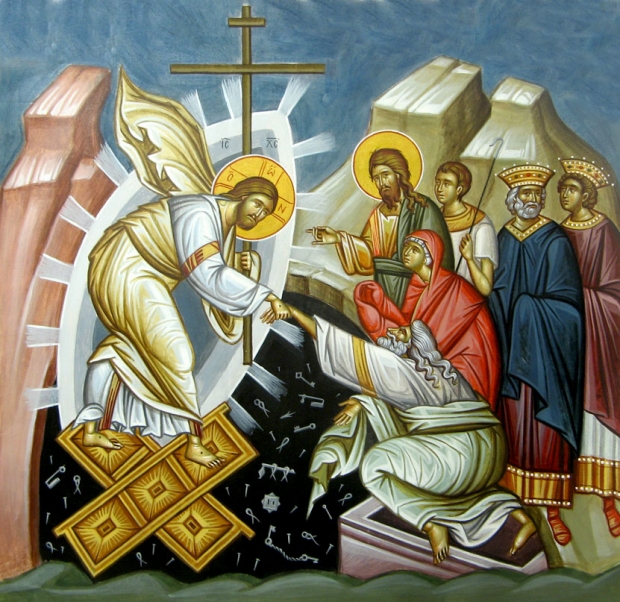 In terms of history, it attests the most fundamental fact in our faith: Christ’s Resurrection and it is indeed an everlasting monument of the Resurrection and constant evidence that Christ has risen.
In terms of history, it attests the most fundamental fact in our faith: Christ’s Resurrection and it is indeed an everlasting monument of the Resurrection and constant evidence that Christ has risen.
In terms of theology, the Sacrament of the Eucharist in the Orthodox Church brings God on earth with his body and blood.
In terms of ecclesiology, it helps us realize the notion of Church as a whole body: the visible part and the invisible, through the worship and preaching to the congregation.
Spiritually, it increases and renews our faith as it gives us the chance to be fed with the flesh of God, to quench our thirst with His divine words, to talk to Him through prayers, to live in his holy family by communicating with the other members of the Church.
Ethically, it helps us abstain from sin throughout the week. The sanctifying power that Sunday offers, as well as our pious desire to accept its blessings again and again, allow us not to fall victims to our desires.
Psychologically, it is a celebration, a happy break from the six-day labor, which every tired person comes across weekly.
Moreover, socially it helps to develop our relationships in the most wonderful way. People with numerous diversities (political-educational-financial) with only one common point, the same faith, with the same petitions meet in a peaceful congregation around the same table. We visit each other joyfully, but at the same time we take part in the pain, the poverty and the misery of our fellow humans. Is there another day, indeed, which has the social features we find on Sunday?
These are not the only presents that Sunday offers. We could enumerate many more but the list would not be exhausted. That is because what is offered by Sunday is multiplied, as it spreads in the life of every believer. So, something amazing takes place: Sunday is not just an extraordinary day during which we get the power to live through the rest of the days, but its grace penetrates throughout the week. Therefore, every time we open our arms to embrace Sunday fully, we move upwards in the scale of our relationship with God and this is certainly not diminished during the rest of the days, but we stay there the whole week, since our heart beats on the rhythm of Sunday. Next Sunday we move one step forward and stay there during the whole week and then we go on in the same way.
However, we are in danger of losing this invaluable day, because we do not appreciate it and we leave it exposed to be violated by sacrilegious people. Sunday, like every divine issue, is targeted by every power opposed to God threatening to replace or extinguish it. This attack against Sunday is, indeed, an attempt against God. Since God can’t be discounted the only thing to be achieved for humans is to hurt themselves, both spiritually and physically. If we lose Sunday, we lose our Lord and consequently we lose ourselves because this day we surrender ourselves to Him and take them back sanctified, transformed and resurrected.
Every Sunday is an Easter and a Resurrection. When we experience it and wait for it in this way, we can celebrate Easter every week and every Easter we can rejoice a unique Sunday. With this kind of experiences, our life is brightened and Sunday becomes the most desirable day. “This is the chosen and Holy Day, the first of the Sabbaths, the Queen and the Sovereign, the Feast of Feasts, and the Festival of Festivals” that makes our life beautiful and refreshes our soul. It is the day that our Lord offers us to be happy and rejoice with Him.
Copyright © 2021 by Orthodox Christian Association «ΧΡΙΣΤΙΑΝΙΚΗ ΕΛΠΙΣ» ΟΡΘΟΔΟΞΗ ΑΔΕΛΦΟΤΗΤΑ. Used by permission. All rights reserved.
Translation from the book:
Στεργίου Ν. Σάκκου, ΚΥΡΙΑΚΗ ἡ ἀναστάσιμη ἡμέρα,
ἐκδ. «ΧΡΙΣΤΙΑΝΙΚΗ ΕΛΠΙΣ»
ΟΡΘΟΔΟΞΗ ΑΔΕΛΦΟΤΗΤΑ, ἔκδ. 4η, Θεσ/νίκη 2020, σσ. 17-24
(Stergios N. Sakkos [Read CV],
SUNDAY: The Day of Resurrection, pp. 17-24)
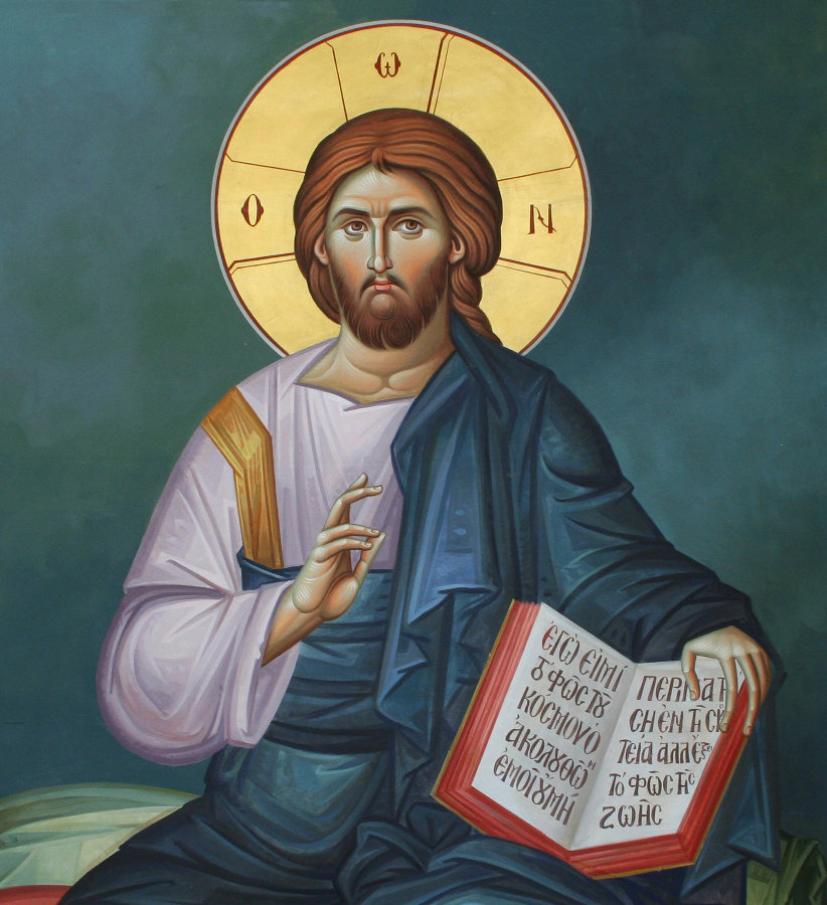 Part 2
Part 2
Sunday: its theology
God came and walked on earth. He left His footprints on several places and some of these are:
• The stable in Bethlehem, where He was born in a manger,
• the lake in Galilee, where He walked and chose His first disciples,
• the hillsides and plains that heard His voice teaching the crowds,
• the mount of Transfiguration that saw His divinity shining like the sun,
• the garden of Gesthemane, where He shed tears of anguish,
• the place of Golgotha, where He shed His blood,
• his empty tomb.
The whole Palestine, which He crossed “doing good and healing” (Acts 10,38), is the Holy Land that reminds us of Godman's visit. We can go to this Holy Land if we wish and kneel on the sacred ground. However, we can also find this Holy Land in every Church because there we can enter Christ's life through the Holy Sacraments:
♦ In the Prothesis (Preparation table) we see Bethlehem,
♦ in the Holy Altar we stare at Golgotha,
♦ in the baptismal font we see the river Jordan,
♦ from the oil lamp of the sanctuary we take the light of the Resurrection.
On the other hand, during His lifetime lots of divine signs took place:
◊ Epiphany, when God Father showed His Son and the Holy Spirit rested on Him in the form of a dove,
◊ the Passion, when Jesus was gradually led to His crucifixion and death,
◊ the Resurrection, that filled with light and happiness the hearts of the faithful,
◊ the Ascension, which glorified human nature,
◊ the Pentecost, when the Holy Spirit laid the foundation of the Church.
All those supernatural events that brought salvation to the suffering human beings are the religious celebrations of our Church that keep, through the grace of the Sacraments, alive the presence of Christ among us. So, the faithful, no matter of the age we live in, can:
√ Meet our Lord Jesus Christ, the Godman,
√ become his disciples,
√ walk with Him,
√ listen to His words,
√ see His miracles,
√ live His Resurrection,
√ commune Him.
All the above, that is, the Holy Land and the sacred celebrations, are offered in a way that only God could cοnceive and attain, in the day of Sunday. On Sunday and during the Divine Liturgy, being its essential feature, we gather in church where our Lord comes physically through the Holy Eucharist. Sunday helps us to take part in His life from the manger to the empty tomb. There, in the Church, in front of the holy altar and among the angels and saints we embrace God’s space and our soul rests, because it senses the divine eternity. At the same time we enter in God’s time through the Holy Communion where Christ is present in the bread of Prothesis, on the altar and in the Holy Chalice. Then our soul, full of eternity, rejoices. Sunday offers a spiritual space without borders and a limitless time. It brings God both in our life and heart... Sunday offers an always present experience of God’s love, which is expressed and realized tangibly in the Divine Liturgy.
It is, also, a living memorial of the past, a kind of a historical witness. It is a one and only witness in the course of humanity that constantly testifies the redemptive work of the resurrected Christ until this day.
Also, Sunday is a prophecy of the future, as the enlightened Fathers of our Church have remarked. The present world is included in the seven days of the week, which are constantly recycled till this world comes to an end. Sunday is considered to be the eighth day, which succeeds the seventh, and prophesies the future life, inaugurated by Christ’s resurrection. This eighth day is the sweet eternity of God’s kingdom. It starts now in Christ’s Church and expands farther after this earthly time. Sunday allows us to have this experience in advance.
When God started the creation of the world by bringing light in the abyss it was the first day of time. “And there was evening and there was morning, one day” (Ge 1,5). It was also the first day of the week when Christ started reforming mankind by defeating death in Hades, “But on the first day of the week” (Lk 24,1). So, on Sunday the faithful celebrate both the birthday of the creation and the revival of humanity by Jesus Christ, while we experience in advance the future world of eternity, the heavenly rebirth.
When we talk about the theological meaning of Sunday, we present the great truths of our faith. Sunday is:
• The first day of the world’s creation,
• the day of the Resurrection and man’s re-creation,
• the apocalyptic day of the future eternity,
• the day of Divine Liturgy in our church life.
Thinking of Sunday we feel, indeed, the need:
◊ To thank God for the world He offered us,
◊ to praise Him for His Church and His Resurrection and,
◊ to have an ever ending expectation for His blessed kingdom.
The existence of Sunday in the worldly calendar constitutes a visit of God Himself, Who by approaching us breaks the earthly boundaries and opens the way to heaven, the way that leads to His Presence.
To be continued
Copyright © 2021 by Orthodox Christian Association «ΧΡΙΣΤΙΑΝΙΚΗ ΕΛΠΙΣ» ΟΡΘΟΔΟΞΗ ΑΔΕΛΦΟΤΗΤΑ. Used by permission. All rights reserved.
